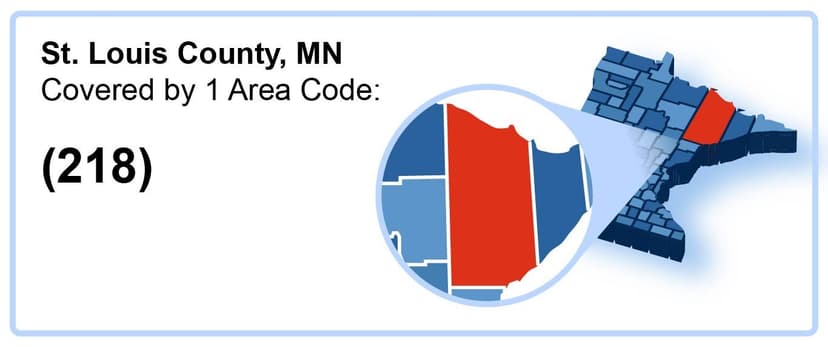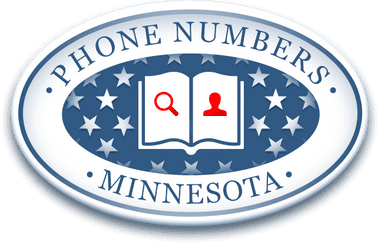What are St. Louis County Area Codes?

Area codes differentiate the telephone service areas in a state as designated by the North American Numbering Plan (NANP). Telephone service areas are distinct geographical locations called Numbering Plan Areas (NPAs). St. Louis County area code is the sequence of three-digit numbers at the beginning of all local phone numbers registered in St. Louis County. The Minnesota Public Utilities Commission administers area codes in Minnesota.
Only one area code (218) currently serves St. Louis County.
Area Code 218
Area code 218 is one of the original 86 area codes created in 1947, and it covers the northern part of Minnesota. St. Louis County cities and communities under this area code include Duluth, Grand Lake, Babbitt, North Star, Midway, Meadowland, Balkan, Mountain Iron, and Buhl.
What are the Best Cell Phone Plans in St. Louis County?
Among the total adult residents in Minnesota, 56.2% relied exclusively on cell phones for telecommunication, in contrast to 4.4% who still used only landline phones. The state's under-18 population exhibited a similar trend as 63.2% of them had adopted wireless telephony services, while only 1.9% of them represented sole landline phone users. These statistics, from a 2018 NCHS survey, highlight residents’ increasing reliance on wireless telephony services than landline services in St. Louis County.
Generally, America’s top four phone carriers, A&T, Verizon, T-Mobile, and Sprint, offer reliable network coverage in St. Louis County. AT&T has the best coverage of 97.4%, while T-Mobile ranks second at 94.5% spread. Verizon’s network penetrates 88.3% of the county, and Sprint covers 52.1% of the county. County residents also enjoy alternative network services provided by Mobile Virtual Network Operators (MVNOs) at relatively low rates.
St. Louis County residents are massively adopting Voice over Internet Protocol (VoIP) as an alternative telephony service. VoIP enables residents to make cheaper voice and video calls, especially for long-distance communications, using their existing internet connections. The progressive deployment of state-wide broadband internet infrastructure by the Minnesota Office of Broadband Development continues to drive VoIP adoption in the state.
What are St. Louis County Phone Scams?
These are fraudulent schemes conducted over the phone to cheat St. Louis County residents out of their money and obtain confidential information fraudulently. Scammers often pretend to be representatives of genuine businesses when executing their cons. County residents can use reverse phone lookup applications to foil phone scam attempts and uncover scammers’ identities. The Office of the Minnesota Attorney General and the FTC protect residents against phone scams.
Phone scams that residents of St. Louis County regularly encounter include:
What are St. Louis County IRS Scams?
Although IRS scams are more common during tax seasons, tax scammers are nevertheless active all year round. They use various gimmicks to steal from taxpayers in St. Louis County. Fraudsters pretending to be with the IRS call their marks and tell them to pay their delinquent taxes immediately or risk arrests. These scammers are usually convincing and often spoof the official phone numbers of the IRS to gain their targets’ trust. They typically instruct their targets to pay such taxes via irregular methods such as gift cards and wire transfers. Services that offer reverse phone lookup free services can help residents identify these fraudsters and avoid tax-related scams. In another variant of this scam, scammers pretend to be from the Tax Advocate Service (TAS) and tell taxpayers that they qualify for tax refunds. Although the TAS is a legitimate entity within the IRS, they only assist taxpayers to solve tax-related issues and will never request confidential information. St. Louis County residents who are victims of IRS scams can report online. They can also file complaints with the Treasury Inspector General for Tax Administration (TIGTA) by calling 1 (800) 366-4484.
What are St. Louis County Law Enforcement Impersonation Scams?
Scammers call residents and identify themselves as deputies with the St. Louis County Sheriff’s Office. They leverage the authority and reputation of this agency to ease their marks’ suspicions. These scammers usually spoof the Sheriff’s official phone numbers when preying on their targets. This way, their targets’ caller IDs information will display the Sheriff’s Office phone numbers, giving them the confidence that they are being called by legitimate deputies. Citing various violations such as missed jury duty, traffic tickets, and outstanding warrants, these scammers usually demand immediate payments of fines. The Sheriff’s Office warns county residents to ignore such calls and never to share information or make payments to unknown callers making these claims. St. Louis County residents can verify the authenticity of these claims by contacting the Sheriff’s Office or local law enforcement agencies. Querying such callers’ phone numbers using good reverse phone lookup services will return information on their identities.
What are St. Louis County Stimulus Checks Scams?
In these scams, fraudsters attempt to extort St. Louis County residents who are yet to receive their COVID-19 stimulus payments. These people are prime targets because of their desperation to get money to cushion the effects of the coronavirus pandemic. Scammers often contact their marks using text messages and ask them to click on provided links to update their direct deposits or get more stimulus payments. They often promise to help them fast-track the processing of their stimulus checks. Such links are fraudulent and are designed to steal their victims’ confidential information such as social security numbers and bank account information. With such information, these scammers can either route their victims’ stimulus payments to themselves or steal their money from their bank accounts. In another instance, these fraudsters pose as legitimate bank representatives to request personal information. They deceive their marks into believing they must verify their bank account information to enable correct processing of their stimulus payments. Victims of stimulus check scams in St. Louis County can report them to the St. Louis County Sheriff’s Office for proper investigations.
What are Robocalls and Spam Calls?
These are pre-recorded messages delivered en masse by auto-dialed phone calls. Unlike spam calls, robocalls are often delivered during specific times or seasons. They have several legitimate uses in election campaigns, public service announcements, and school resumption notifications. Telemarketers also use robocalls in reaching mass audiences, although they risk penalties if they do so without consumers’ prior written permission. Scammers, exploiting the advantages of robocalls, continually inundate unwary consumers with automated messages targeted at identifying active phone numbers for future scams. They also use robocalls to obtain unsuspecting persons’ personal and financial information to commit identity and financial theft. Although robocalls avail phone scammers anonymity, St. Louis County residents can use free reverse phone lookups applications to identify robocalls.
You can prevent illegal robocalls and avoid scams by taking the following steps:
- Ignore calls from phone numbers that are not saved in your phone contact list regardless of how persistent the callers may be. Allow such calls to go to your voicemail machine.
- Confirm if your phone service provider offers free call-blocking tools. Most phone carriers usually offer both paid and free services that filter, identify, and bar unwanted calls.
- End all robocalls as soon as you identify them. Dismiss any prompt by the recording to press a number and unlist your number or speak to live operators. Fraudsters use automated calls to identify active phone numbers as potential targets for future scams.
- Submit complaints of all unwanted robocalls to the FTC online or by calling 1 (888) 322-4357.
- Enroll your phone number on the National Do Not Call Registry to reduce unwanted automated calls. The FTC maintains this database and makes it illegal for telemarketers and businesses to call registered phone numbers without the users’ consent. Subsequent scam calls can then be easily identified since fraudsters generally disregard this register.
St. Louis County residents can harness information on blocking unwanted calls on any platform as provided by the FTC.
How Can You Spot and Report St. Louis County Phone Scams?
Phone scams are often difficult to recognize because fraudsters continually adopt new tactics or re-package older schemes to defraud St. Louis County residents. Scammers usually use simple but sophisticated tricks to convince their targets and rip them off. They favor phone spoofing, which helps scammers to stay anonymous and allows them to impersonate legitimate entities. However, the most effective remedies to spot phone scams in St. Louis County include staying up-to-date on trending scams and being vigilant about potential scam calls.
The following clues can help you ascertain if an incoming call is a phone scam:
- Scammers usually claim to work for familiar entities such as a government agency or law enforcement agency, a bank, or a vendor you frequently patronize.
- Fraudsters usually attempt to trick you into letting your guard down by sounding friendly and addressing you by your first name. They, however, act hedgy and rarely provide direct answers to your questions.
- Scammers often demand confidential information like PINs, account passwords, credit card information and social security numbers, and birth dates in unsolicited phone calls.
- Scammers typically request payments by odd channels such as preloaded debit/credit cards, wire transfers, and gift cards. They prefer these payment methods because they preserve anonymity, and transactions completed on them are usually irrecoverable.
- Robocalls likely indicate scam calls, especially if you have enrolled your phone number on the DNC Registry.
- Fraudsters use offers of fake prizes, products, or services such as extended car warranties and loans as bait to defraud unsuspecting persons. Beware of such offers.
- Fraudsters often threaten their marks with arrest and ask them to make immediate fine payments to cancel such arrests. No legitimate entity will threaten residents with arrests over the phone.
Knowledge on how to identify and avoid scams hampers scammers’ attempts to extort residents. Services that offer free phone number lookups by name and address are also helpful in uncovering scammers’ identities. The following public agencies protect St. Louis County residents from phone scams and encourage them to report phone scam incidents:
St. Louis County Sheriff’s Office: The Sheriff’s Office enforces the law and protects residents from criminal activities, including phone scams. They also provide regular alerts about common phone scams and online fraud. St. Louis County residents can file reports of scams with the Sheriff’s Office by calling (218) 726-2000. They can also forward anonymous crime tips online to the Sheriff’s Office.
Federal Trade Commission: The FTC keeps consumers safe from deceptive and unfair business practices in the United States. It established the National Do Not Call Registry to help residents reduce the inundation of robocalls. Also, the FTC regularly publishes phone scam alerts to educate residents. Residents of St. Louis County who have received unwanted robocalls or experienced phone scams can file complaints with the FTC online.
Federal Communications Commission: The FCC protects consumers from phone spoofing scams and illegal robocalls by providing consumer protection tips. Residents of St. Louis County who are victims of phone spoofing scams and other scams can file consumer complaints online with the FCC. Alternatively, they can contact the FCC at 1 (888) 225-5322 to register their complaints
Office of the Minnesota Attorney General: This Office enforces consumer protection laws and pursues restitution for Minnesotans affected by phone scams. They also arm residents with consumer protection information to stay ahead of scammers’ plots. St. Louis County residents can file complaints of phone scam incidents with the Attorney General’s Office online using the Consumer Assistance Request Form.
